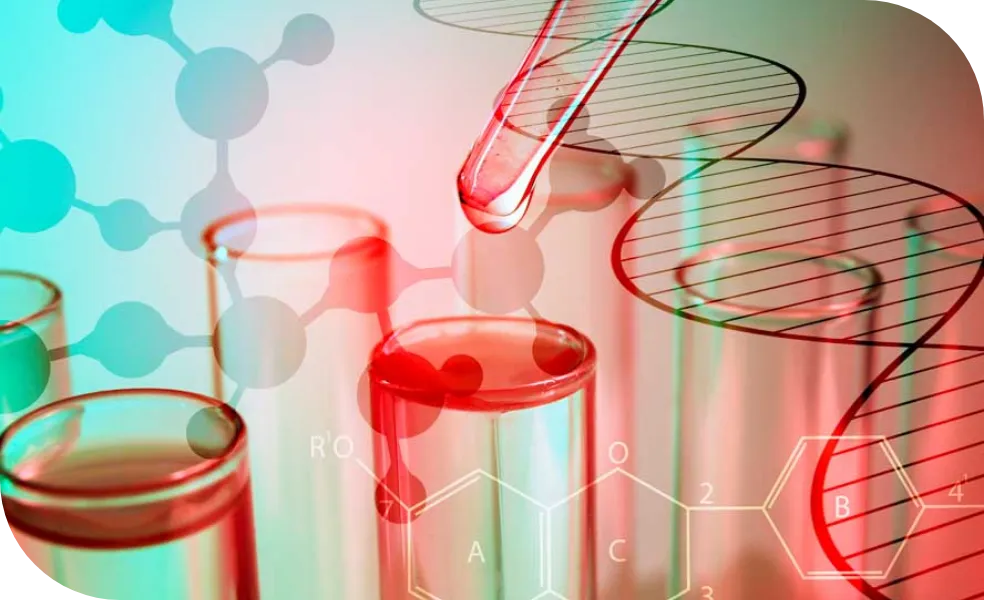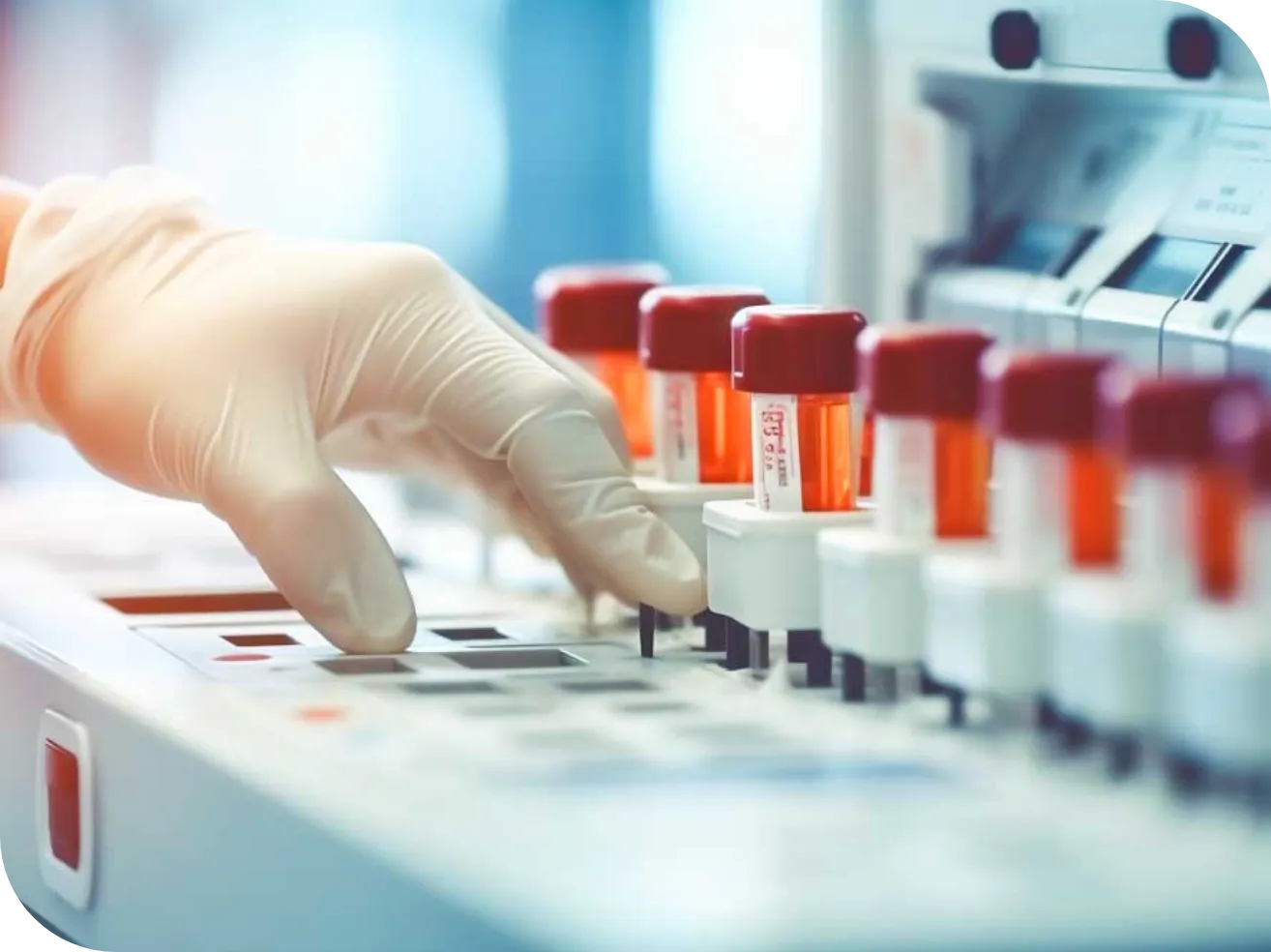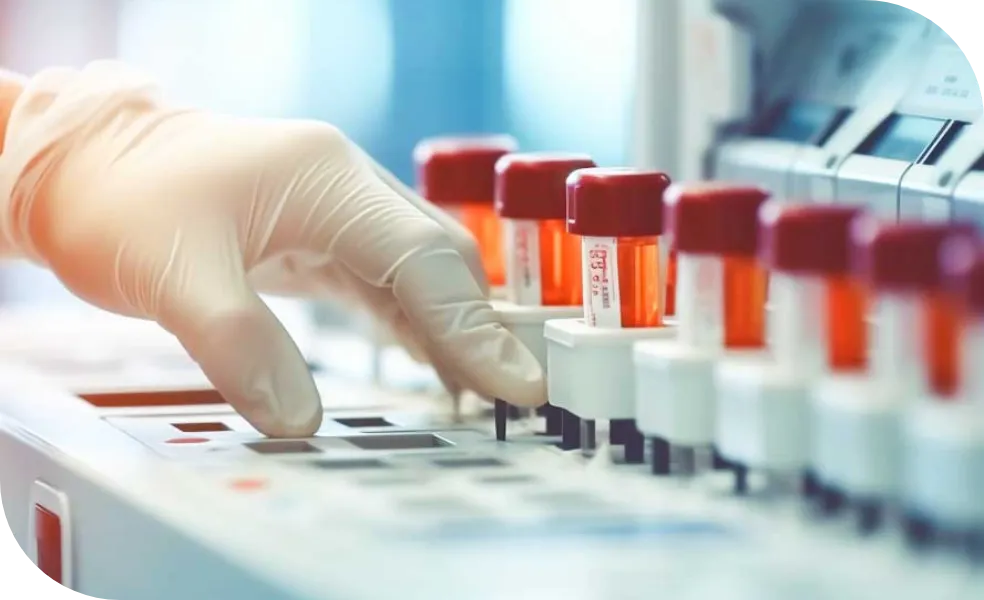

Analysis and Inspection
While there are many biochemical tests used for health checkups and other purposes, we are working to discover new evaluation indices derived from the latest research papers and other sources.
We call this analytical testing, with the meaning of “making a contribution to further health, and adding expertise not only in testing but also in analysis.”
In order to establish optimal cancer treatments for patients, we are conducting gene and protein analysis research on circulating tumor cells and exosomes in the bloodstream.
We also are conducting analytical research on mesenchymal stem cell oxidation, as well as research on anti-aging and regenerative medicine focusing on oxidative stress and growth factors of mesenchymal stem cells.
Genetic Analysis


There is growing concern that the increased longevity of people will increase the chances of genetic mutations, which in turn will increase the risk of cancer and lifestyle-related diseases.
Therefore, we are conducting liquid biopsy research to evaluate the risk of cancer development and metastasis, as well as the effects of anticancer drugs, based on biological samples such as saliva and blood. Our goal is to establish a method that enables not only simple genetic analysis, but also a more thorough analysis through cell experiments that evaluate cancer cell functions by culturing cancer cells, such as circulating tumor cells (CTCs), in the blood.
In addition to the oncology field, we are expanding our research into the anti-aging field, which is in-demand in today's society. We also are conducting research into personalized medicine, in which genetic testing is used to determine which supplements are appropriate for each patient. In addition, we are conducting research on the genetic analysis of mesenchymal stem cells (MSCs).
Exosome Analysis


Exosomes are involved in intercellular communication and play an important role in maintaining homeostasis in living organisms, and are attracting attention in the fields of cancer diagnosis research and regenerative medicine. Therefore, in collaboration with medical institutions, we extract exosomes from biological samples collected from actual cancer patients and use them for analysis. Furthermore, in addition to research to predict the incidence of cancer, we are also conducting research to predict the degree of progression of cancer, the likelihood of metastasis, and the efficacy of anticancer drugs. In addition, as more and more customers have become interested in regenerative medicine in recent years, we are also conducting research to accurately measure the number of exosomes in stem cell culture supernatants. In this way, we are making use of the strength of our partnerships with medical and research institutions to conduct research on a daily basis to contribute to the fields of cancer diagnosis and regenerative medicine.
Oxidative Stress Analysis


Our aging population is increasing the incidence of cancer and lifestyle-related diseases. Many studies have shown that reactive oxygen species (ROS) play an important role in these diseases.
Therefore, it may be possible to mitigate the aging process by studying the effects of ROS on biological samples. Therefore, we are conducting research to analyze the oxidation of nucleic acids such as deoxyribonucleic acid (DNA) and ribonucleic acid (RNA) proteins and lipids by ROS through cell cultures, animal experiments, and clinical trials. In addition, we are conducting research not only to predict the progression of aging by ROS and the diseases caused by it, but also to provide physicians with the materials to enable them to make decisions on the best treatment for each individual based on the results obtained.
Growth Factor Analysis


We analyze the expression levels of various growth factors (GFs), mainly epidermal growth factor (EGF), fibroblast growth factor (FGF), and hepatocyte growth factor (HGF), in biological samples. With the rapid development of regenerative medicine in recent years, treatments using stem cell supernatants and exosomes have been introduced in various medical institutions. On the other hand, the components contained in exosomes and stem cell culture supernatants are dependent on the person from whom they were harvested and the culture method used. So, even if a patient receives treatment at the same medical institution, the effectiveness may vary. Therefore, by analyzing the expression levels of various GFs, we are conducting research to examine the mesenchymal stem cell (MSC) culture method and the timing of supernatant extraction, with the aim of reducing large lot-to-lot variations. In this way, our company is working daily to ensure that medical institutions can provide high-quality, stable regenerative medicine to their patients.




